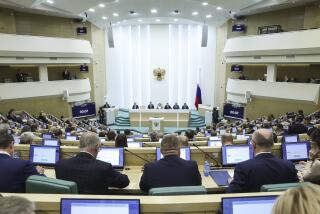Soviets and French Conduct A-Tests; Pacific Blast Angers Lange
- Share via
The Soviet Union conducted an underground nuclear test Wednesday in Central Asia, and France, drawing harsh criticism from Prime Minister David Lange of New Zealand, set off a nuclear device in the South Pacific.
The Soviet blast at a military testing site in Soviet Central Asia was its seventh nuclear explosion since the Kremlin ended a unilateral moratorium in February.
The device--which had a yield of under 20 kilotons, or the equivalent of 20,000 tons of TNT--was set off at the Semipalatinsk testing range in Soviet Kazakhstan, the official Soviet news agency Tass said. The U.S. atomic bomb dropped on Hiroshima in 1945 also had a yield of 20 kilotons.
“The test was staged to check the findings of research into the physics of a nuclear blast,” Tass said.
Similar language has been used in the past to describe a test with military implications. Of the seven blasts conducted by the Soviet Union since it ended its moratorium Feb. 26, five have been for military purposes and two for civilian research, such as exploration of oil and gas deposits.
The United States has conducted four underground nuclear tests in Nevada this year.
Soviet leader Mikhail S. Gorbachev declared a unilateral moratorium on nuclear testing Aug. 6, 1985, the 40th anniversary of Hiroshima. Washington refused to join, saying that testing was required to develop new weapons and prove the reliability of existing arsenals.
Gorbachev said in December that the Soviets would resume testing after the first U.S. blast of 1987.
France exploded its nuclear device Wednesday at its Mururoa Atoll test site in the South Pacific, prompting Lange to criticize the French for bringing “an element of insecurity” to the region.
New Zealand scientists said the blast--estimated at 5 kilotons--was the first French underground test of 1987.
“French nuclear testing in the South Pacific has been condemned by successive New Zealand governments for more than 20 years,” Lange said.
“This activity by a nuclear weapon state, in blatant disregard of the conditions of the South Pacific Nuclear Free Zone Treaty, adds an element of insecurity to our lives,” he said.
France has held underground tests at Mururoa since 1975. Wednesday’s blast, 2,800 miles northeast of Wellington, was France’s 82nd in the region.
“Despite France having ignored our protests for so long, we have no intention of becoming complacent about their testing program,” Lange said. “We shall continue to press, internationally, for the commencement of practical work on a nuclear test ban treaty.”
More to Read
Sign up for Essential California
The most important California stories and recommendations in your inbox every morning.
You may occasionally receive promotional content from the Los Angeles Times.










